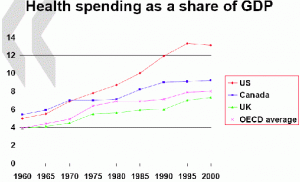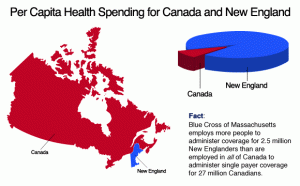
The chart at the top of this post shows what happened to per-capita costs when Canada went to single payor. What’s interesting is that before Canada went single payor, per capita health costs in Canada were higher than in the US. Over time, after single-payor was implemented, they they stayed even until about two-thirds of US costs, and then they started rising again. The rate they rose at was about the same as American health care costs, but they stayed at about two-thirds of the cost.
In other words, single payor is the simplest way to get a one time savings in health care costs. It has worked for every other country which has tried it (and yes, most European systems are variations on single payor. They aren’t “pure” but they are still essentially single payor).

The next graphic shows the difference in administration costs. This is one main reason why single payer is cheaper than a private system—it takes a lot less people to administer. American hospitals have billing wings. Canadian hospitals have a room or two of people who do all the billing.
This is the single-payer challenge to the public option. Can it hold costs even until they are about one-third less than they would have otherwise been? Until they are about even with the rest of the civilized world’s costs?
I’d put my money on a simple, heartfelt no. Look hard in the mirror and try and tell yourself otherwise.
Single payer, or “Medicare for all” isn’t a long term solution to health care costs. But it could buy the country a good ten years before costs start rising again. That’s a lot of time. A lot of money. And a big challenge for any other plan to meet.
Which leads us to the question of taxes. Every time someone starts whining about how taxes have to rise to pay for universal healthcare I want to smash my head against the nearest brick wall (since that’s softer than most of the skulls in Congress or the media). Those per-capita costs above? They aren’t for just “insured Americans”, they are divided across the entire population. America is already paying more than enough money to give everyone health care, but because so much of it is being wasted, 48 million are uninisured and 62% of all bankruptcies are caused by health care problems, and 75% of those had what in the US is laughably refered to as “health care insurance”.
If proper health care reform occurs. Health care reform which holds down costs, taxes might rise, but the overall cost should hold steady or rise only slightly. If employers who provide insurance now are allowed to keep half the money, and required to give half of it as a raise to the employees losing the insurance benefit, and if corporations and employees are taxes, the average person will have the same amount of money as they did before universal healthcare. And very quickly, within a few years, they will have more money in pocket than they would have without it.
Does it matter who you pay your health care money to? The government or the insurance companies, as long as you get care? And if the government can do it for cheaper, so you’ll have more money left over, for better care (and yes, Virginia, every country in the world with real universal health care has better overall results than the US) why wouldn’t you want that?
But no politicians comes out and says this. “We are paying too much for health care. You, my fellow citizens, are paying too much for bad health care. What we are going to do is make sure that you get good health-care for less money. Because yes, my friends, the government is better at some things than private companies, and health insurance is one of them.”
This is the bottom line—single payer—Medicare for all—is cheaper and provides better results than the current system.
Can any of the bills going through Congress say the same? If they can, can they say it to the same extent?
That’s the single-payor challenge. And like one of those old time boxing challenges where the boxer would take on all comers, I’m betting the public option rube is going to get his clock cleaned.
Which would be no big deal, except that it means a lot of people are going to die and suffer and go bankrupt who wouldn’t have if Congress members weren’t too beholden to insurance companies to do, for once, what is right for Americans. I don’t know why they won’t do what’s right. I don’t know why they won’t do what’s proven to work, rather than try and cobble together a rickety unproven plan.
But I can only assume it’s like the old question we used to ask about the Bush administration. “Evil or stupid?”
Evil – taking health insurance company money and doing what they know is wrong because they’ve been bought.
Stupid-so ideologically blind that they think that even if every other country who’s gone single payer has had it work, it’s still a bad thing because the private sector is always better than the government, no matter how many people it kills or bankrupts.
I don’t know. But either way, they’re failing the single payer challenge.
